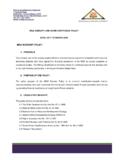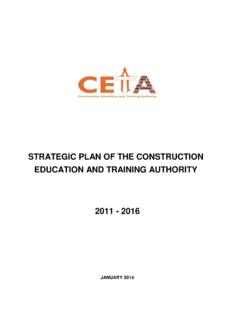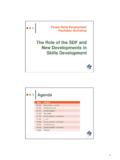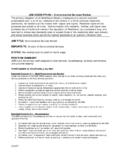Transcription of MQA FUNDING POLICY
1 MQA FUNDING POLICY . 1 April 2018 to 31 March 2019. MQA FUNDING POLICY 2018-2019 Financial Year Page 1 of 45. Board Approved 28 February 2018. TABLE OF CONTENTS. 1. INTRODUCTION .. 6. 2. OBJECTIVE OF MQA FUNDING POLICY .. 6. 3. PRINCIPLES OF THE MQA FUNDING POLICY .. 7. 4. MANDATORY GRANTS POLICY .. 7. 5. DISCRETIONARY GRANTS AND PROJECTS POLICY .. 8. 6. GENERAL .. 10. 7. ADMINISTRATIVE REQUIREMENTS .. 10. 8. CHANGES IN LEVIES RECEIVED FROM SARS .. 11. 9. MONITORING AND REVIEW OF POLICY .. 11. 10. EFFECTIVE 11. ANNEXURE A LEGISLATIVE FRAMEWORK .. 13. ANNEXURE B MQA MANDATORY GRANTS POLICY .. 18. ANNEXURE C DISCRETIONARY GRANT RULES AND LEVELS .. 19. ANNEXURE D LIST OF DISCIPLINES PER PROJECT .. 39. ANNEXURE E DISPUTE RESOLUTION ..43. ANNEXURE F GOVERNMENTNMENT GAZETTE, 35940 SETA GRANT REGULATIONS . amended 15 JULY 2013 .. 44. ANNEXURE G NATIONAL ARTISAN DEVELOPMENT WORKPLACE DATA, LEARNER GRANT. FUNDING AND ADMINISTRATION SYSTEM POLICY MAY 2017 .. 44. ANNEXURE H MQA BURSARY AND WORK EXPERIENCE POLICY JANUARY 2017.
2 44. MQA FUNDING POLICY 2018-2019 Financial Year Page 2 of 45. Board Approved 28 February 2018. LIST OF ABBREVIATIONS AND ACRONYMS. AET Adult Education and training ATR Annual training Report CEP Community of Expert Practice DGAC Discretionary Grants Adjudication Committee DGEC Discretionary Grants Evaluation Committee DHET Department of Higher Education and training DoL Department of Labour FLC Foundational Learning Competency GET General Education and training HDSA Historically Disadvantaged South African MIS Management Information System MMS Mining and Minerals Sector MOA Memorandum of Agreement MQA Mining Qualifications Authority NLPE Non-Levy Paying Enterprise NQF National Qualifications Framework NSDS National Skills Development Strategy NSF National Skills Fund OFO Organising Framework for Occupations OHS Occupational Health and Safety PIVOTAL Professional, Vocational, Technical and Academic Learning PSET Post School Education and training QCTO Quality Council for Trades and Occupations QDF Qualification Development Facilitators RPL Recognition of Prior Learning SAQA South African Qualifications Authority SARS South African Revenue Services SDA Skills Development Act SDL Skills Development Levy SDL Act Skills Development Levies Act SDP Skills Development Provider SETA Sector Education and training Authority SLA Service Level Agreement SME Small and Micro Enterprises SOP Standard Operating Procedure SSP Sector Skills Plan TRG Technical Reference Group TVET Technical and Vocational Education and training WSP Workplace Skills Plan MQA FUNDING POLICY 2018-2019 Financial Year Page 3 of 45.
3 Board Approved 28 February 2018. DEFINITIONS. PIVOTAL' is an acronym which means professional, vocational, technical and academic learning programmes that result in qualifications or part qualifications on the National Qualifications Framework as contemplated in regulation 3(6) and (7) as read with regulation 6(11) to (15) of the SETA Grant Regulations : Government Gazette Number 35940. Labour Representative' means a representative of the labour constituency within the workplace, appointed by the recognized trade union. Sign-off' means an in principle agreement between the employer and its recognised trade union or unions on the identified training interventions as is provided for in regulation 5(2)f. First-Come-First-Serve-Basis' refers to the following: Employers that qualify for the grant on registration of the learners: For programmes where a learner is paid for upon registration, a learner is required to be registered by the MQA on the relevant learning programme for the employer to qualify for the grant.
4 All criteria for the learner to be registered on the agreement must be fulfilled as per The Learnerships Regulations. The learners would be supported on a first-come-first-serve- basis until all funds are depleted for the specific project. Employers that qualify for the grant on completion of the programme by learners: For programmes where a learner is paid for successful completion of a programme, the learner would attract the grant under the following criteria being met: o When all correct required supporting documents are uploaded and/or submitted o If his/her assessment records are captured on the MQA MIS. o The achievements are approved by the ETQA Unit based on the date of approval. An example of this is, if there are 10 000 grants available for the OHS Rep Project, the first 10 000 learners approved by the ETQA Unit for certification would qualify for the grant. Employers' are defined as organisations that are registered and paying their skills development levies to the MQA as well as those that are exempted from paying levies.
5 MQA FUNDING POLICY 2018-2019 Financial Year Page 4 of 45. Board Approved 28 February 2018. Accredited training Provider' means any person or body who, having met the quality assurance criteria laid down by QCTO, has been formally recognised by SAQA through the relevant Quality Council Accredited skills development provider' means a provider of occupationally directed learning programmes that are part or full qualifications accredited by the Quality Council for Trades and Occupations (QCTO). Consultation' means the act or process of consulting with the relevant stakeholders. Consultation means that parties must engage in a thorough and meaningful joint consensus- seeking process. NLPE' refers to non-levy paying enterprises and includes CBO's, NGO's and Co-Ops. Levy paying employer means an employer who is compelled to pay skills development levies in terms of section 3(1) of the Skills Development Levies Act Exempted levy payer means o Any public service employer in the national or provincial sphere of government.
6 (These employers must budget for an amount equal to the levies payable for training and education of their employees). o Any national or provincial public entity if 80% or more of its expenditure is paid directly or indirectly from funds voted by Parliament. (These employers must budget for an amount equal to the levies payable for the training and education of their employees). o Any public benefit organisation which is exempt from the payment of income tax in terms of section 10(1)(cN) of the Income Tax Act which solely carries on welfare and humanitarian, certain health care and religious belief or philosophy public benefit activities which solely provides funds to such public benefit organisation. o Any municipality in respect of which a certificate of exemption has been issued by the Minister of Labour. o Any employer where the total leviable amount of all its employees over the next 12. months will not exceed R500 000. o Although the above-mentioned employers are exempt from the payment of the levy, these employers (excluding the employer where the leviable amount does not exceed R500 000) are NOT absolved from registration in terms of section 5(6) of the Skills Development Levies Act.
7 Targeted approach: o Methodology utilised to approach employers/organisations that show interest in delivering MQA programmes, or employer/organisations that MQA can partner with on projects of common interest. MQA FUNDING POLICY 2018-2019 Financial Year Page 5 of 45. Board Approved 28 February 2018. 1. INTRODUCTION. The Skills Development Act, 97 of 1998 as amended aims to provide an institutional framework to implement national, sectoral and workplace strategies to develop and improve the skills level of the South African workforce. The Act makes provision for the establishment of SETA's as institutional vehicles to implement the Skills Development Act and other related legislation. In the mining and minerals sector (MMS) this includes the Mine Health and Safety Act of 1996 and the Mineral and Petroleum Resources Development Act (MPRDA) of 2002. This POLICY is aligned with the provisions of the Grant Regulations published under the Skills Development Act in Government Gazette No 35940 dated 03 December 2012.
8 These regulations give the legislative framework for the management and disbursement of all funds received by a SETA. Consideration has been given to the commitment contained in the relevant national POLICY imperatives including National Skills Accord and National Skills Development Strategy (NSDS III). 2. OBJECTIVE OF MQA FUNDING POLICY . The objective of this POLICY is to provide a clear framework that can be applied to all MQA FUNDING mechanisms that will enable allocation and disbursement of funds that would best support the mining and minerals sector skills needs. The POLICY is applicable to and in support of MQA levy paying organisations, non levy paying enterprises (NLPE), accredited skills development providers (SDP), Accredited training Provider (ATP), Technical and Vocational Education and training (TVET), service providers and other stakeholders in the MMS who qualify to access MQA mandatory and/or discretionary grants or project FUNDING . The POLICY is in support of national and sectoral policies and initiatives without prejudice or preference to either.
9 MQA FUNDING POLICY 2018-2019 Financial Year Page 6 of 45. Board Approved 28 February 2018. 3. PRINCIPLES OF THE MQA FUNDING POLICY . This POLICY must always result in FUNDING mechanisms that will support the prevailing strategic objectives of the MQA which are: 1. Promote efficient and effective governance and administration 2. Improve skills development planning and decision making through research 3. Promote work-based skills development to support transformation in the MMS. 4. Facilitate access to occupationally directed learning programmes for the unemployed 5. Support training initiatives in mine communities 6. Ensure the delivery of quality learning programmes in the MMS. This POLICY will also strive to apply the following principles: 1. Sound financial management and disbursement of funds as per the National POLICY Imperatives. 2. Delivery of the MQA Mandate through the approved Strategic Plan, Annual Performance Plan (APP), Sector Skills Plan (SSP) and Scarce and Critical Skills.
10 3. Alignment with key POLICY directives, regulations and sector needs. 4. Responsiveness to the sector needs through innovation, efficiency and delivery of skills development. 5. The allocation and disbursement of funds shall be administered in a fair, auditable, transparent matter that supports the objectives of the MQA. 6. The MQA's Mandate shall be discharged in consultation with the relevant stakeholders in the sector. 7. Supporting the progression of training beneficiaries in PIVOTAL programmes. 8. Prioritizing training interventions that yield the desired outcomes and results. This POLICY will be aligned to the financial year of the MQA which commences annually on 1st April and ends on 31st March the following year. 4. MANDATORY GRANTS POLICY . This POLICY is aligned to the Skills Development Act, 97 of 1998 as amended, and the Grant Regulations Sections 4 and 5 as amended that are attached as Annexure A. MQA's Mandatory Grant POLICY is attached as Annexure B.










